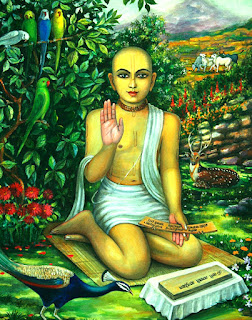Worshiping Krishna as the substratum in all beings

I had to tend to other duties the past week or so and thus was unable to complete the article I started earlier. On thinking about Muralishwar's comment that my belief is that "human love IS Love Divine." Although I there said "the natural loves can be sadhanas of Divine Love within the context of bhakti-yoga, " the fact is that for a pure devotee human love and divine love are indeed one. The reason for that is that Krishna is the ātmā of all ātmās , the soul of all souls, the Self of all selves, ātmānam akhilātmanām . In the previous article, it was said that the difference between kāma and prema is really centered on the Object of that love. If one loves Krishna, that is prema . If one loves someone else without any knowledge of the fact that there is nothing outside of Krishna, then it is kāma . kṛṣṇam enam avehi tvam ātmānam akhilātmanām jagad-dhitāya so’py atra dehīvābhāti māyayā vastuto jānatām atra kṛṣṇaṁ sthāsnu cariṣṇu ca bhagavad-rūpam ...



